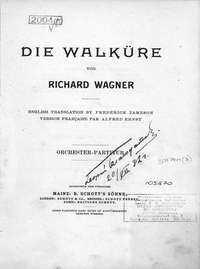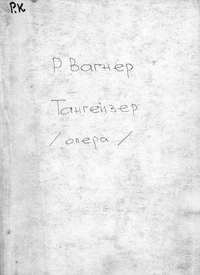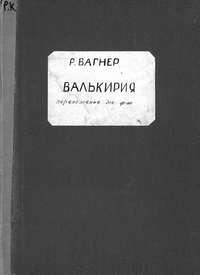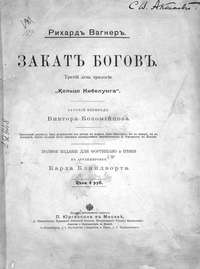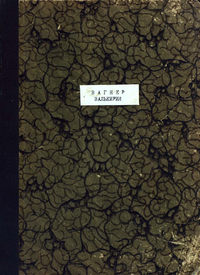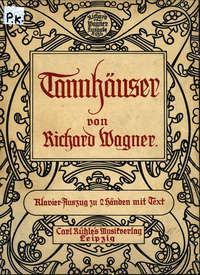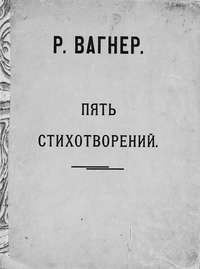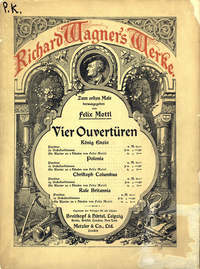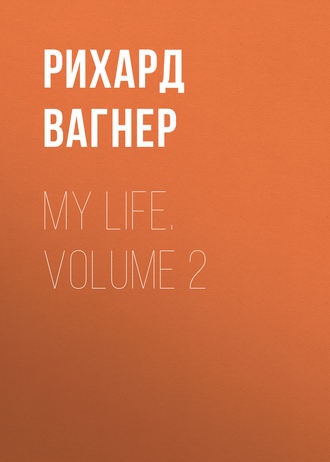 полная версия
полная версияMy Life. Volume 2
But at last came the hour of deliverance from even those evils which I had brought upon myself by my last assumption that I might be accepted, not to say wanted, in the great world. The sole consolation I had was in the deep emotion of my new friends when I took leave of them. I hurried home by way of Paris, which was clothed in its summer glory, and saw people really promenading again, instead of pushing through the streets on business. And so I returned to Zurich, full of cheerful impressions, on the 30th of June, my net profits being exactly one thousand francs.
My wife had an idea of taking up her sour-milk cure again on the Selisberg by Lake Lucerne, and as I thought mountain air would be good for my impaired health also, we decided to move there at once. Our project suffered a brief delay through the fatal illness of my dog Peps. As the result of old age in his thirteenth year, he suddenly exhibited such weakness that we became apprehensive of taking him up the Selisberg, for he could not have borne the fatigue of the ascent. In a few days his agony became alarmingly acute. He grew stupid, and had frequent convulsions, his only conscious act being to get up often from his bed (which was in my wife's room, as he was usually under her care) and stumble as far as my writing-table, where he sank down again in exhaustion. The veterinary surgeon said he could do no more, and as the convulsions gradually became terribly acute, I was advised to shorten the poor animal's cruel agony and free him from his pain by a little prussic acid. We delayed our departure on his account until I at last convinced myself that a quick death would be charity to the poor suffering creature, who was quite past all hope. I hired a boat, and took an hour's row across the lake to visit a young doctor of my acquaintance named Obrist, who had, I knew, come into possession of a village apothecary's stock, which included various poisons. From him I obtained a deadly dose, which I carried home across the lake in my solitary skiff on an exquisite summer evening. I was determined only to resort to this last expedient in case the poor brute were in extremity. He slept that last night as usual in his basket by my bedside, his invariable habit being to wake me with his paws in the morning. I was suddenly roused by his groans, caused by a particularly violent attack of convulsions; he then sank back without a sound; and I was so strangely moved by the significance of the moment that I immediately looked at my watch to impress on my memory the hour at which my extraordinarily devoted little friend died; it was ten minutes past one on the 10th of July. We devoted the next day to his burial, and shed bitter tears over him. Frau Stockar-Escher, our landlady, made over to us a pretty little plot in her garden, and there we buried him, with his basket and cushions. His grave was shown me many years after, but the last time I went to look at the little garden I found that everything had undergone an elegant transformation, and there were no longer any signs of Pep's grave.
At last we really started for the Selisberg, accompanied this time only by the new parrot—a substitute for good old Papo—from the Kreutzberg menagerie, which I had bought for my wife the year before. This one was a very good and intelligent bird also, but I left him entirely to Minna, treating him with invariable kindness, but never making a friend of him. Fortunately for us, our stay in the glorious air of this summer resort, of which we had grown very fond, was favoured by continuous fine weather. I devoted all my leisure, apart from my lonely walks, to making a fair copy of that part of the Walkure which was fully scored, and also took up my favourite reading again—the study of Schopenhauer. I had the pleasure of receiving a charming letter from Berlioz, together with Les Soirees de l'Orchestre, his new book, which I found inspiriting to read, although the author's taste for the grotesque was as foreign to me here as in his compositions. Here, too, I met young Robert von Hornstein again, who proved himself a pleasant and intelligent companion. I was particularly interested in his quick and evidently successful plunge into the study of Schopenhauer. He informed me that he proposed to settle for some time in Zurich, where Karl Ritter, too, had decided to take permanent winter quarters for his young wife and himself.
In the middle of August we returned to Zurich ourselves, and I was able to devote myself steadily to completing the instrumentation of the Walkure, while my relations with former acquaintances remained much the same. From outside I received news of the steady persistence with which my Tannhauser was, little by little, being propagated in German theatres. Lohengrin, too, followed in its steps, though without a first meeting with an entirely favourable reception. Franz Dingelstedt, who was at the time manager of the court theatre at Munich, undertook to introduce Tannhauser there, although, thanks to Lachner, the place was not prepossessed in my favour. He seemed to have managed it fairly well; its success, however, according to him, was not so great as to allow of my promised fee being punctually paid. But my income, owing to the conscientious stewardship of my friend Sulzer, was now sufficient to permit me to work without anxiety on that account. But I met with a new vexation when colder weather set in. I suffered from innumerable attacks of erysipelas during the whole winter, each fresh attack (in consequence of some tiny error of diet, or of the least cold) being attended by violent pain. It was obviously the result of the ill effects of the London climate. What pained me most was the frequent interruption of my work on this account. The most I could do was to read when the illness was taking its course. Burnouff's Introduction a l'Histoire du Bouddhisme interested me most among my books, and I found material in it for a dramatic poem, which has stayed in my mind ever since, though only vaguely sketched. I may still perhaps work it out. I gave it the title of Die Sieger. It was founded on the simple legend of a Tschantala girl, who is received into the dignified order of beggars known as Clakyamouni, and, through her exceedingly passionate and purified love for Ananda, the chief disciple of Buddha, herself gains merit. Besides the underlying beauty of this simple material, a curious relation between it and the subsequent development of my musical experience influenced my selection. For to the mind of Buddha the past life (in a former incarnation) of every being who appears before him stands revealed as plainly as the present; and this simple story has its significance, as showing that the past life of the suffering hero and heroine is bound up with the immediate present in this life. I saw at once that the continuous reminiscence in the music of this double existence might perfectly well be presented to the emotions, and I decided accordingly to keep in prospect the working out of this poem as a particularly congenial task.
I had thus two new subjects stamped on my imagination, Tristan and Die Sieger; with these I was constantly occupied from this time onwards, together with my great work, the Nibelungen, the unfinished portion of which was still of gigantic dimensions. The more these projects absorbed me, the more did I writhe with impatience at the perpetual interruptions of my work by these loathsome attacks of illness. About this time Liszt proposed to pay me a visit that had been postponed in the summer, but I had to ask him not to come, as I could not be certain, after my late experiences, of not being tied to a sick-bed during the few days he would be able to give me. Thus I spent the winter, calm and resigned in my productive moments, but moody and irritable towards the outside world, and consequently a source of some anxiety to my friends. I was glad, however, when Karl Ritter's arrival in Zurich allowed him to become more intimate with me again. By his selecting Zurich as a settled home, for the winter months, at any rate, he showed his devotion to me in a way that did me good, and wiped out more than one bad impression. Hornstein had actually managed to come too, but could not stay. He declared he was so nervous that he could not touch a note of the piano, and made no attempt to deny that the fact of his mother's having died insane made him very much afraid of going mad himself. Although this in a way made him interesting, his intellectual gifts were marred by such weakness of character, that we were soon reduced to thinking him fairly hopeless, and we were not inconsolable when he suddenly left Zurich.
My circle had gained considerably of late by the addition of a new acquaintance, Gottfried Keller, a native of Zurich, who had just returned to the welcoming arms of his affectionate fellow-townsmen from Germany, where his writings had brought him some fame. Several of his works—in particular, a longish novel, Der Grune Heinrich—had been recommended to me in favourable though not exaggerated terms by Sulzer. I was therefore surprised to find him a person of extraordinarily shy and awkward demeanour. Every one felt anxious about his prospects on first becoming acquainted with him, and it was indeed this question of his future that was the difficulty. Although everything he wrote showed great original talent, it was obvious at once that they were merely efforts in the direction of artistic development, and the inevitable inquiry arose as to what was to follow and really establish his fame. I kept continually asking him what he was going to do next. In reply he would mention all sorts of fully matured schemes, which would none of them hold water on closer acquaintance. Luckily a government post was eventually found for him (from patriotic considerations, it seemed),—where he no doubt did good service, although his literary activity seemed to lie fallow after his early efforts.
Herwegh, another friend of longer standing, was less fortunate. I had worried myself for a long time about him too, trying to think that his previous efforts were merely introductions to really serious artistic achievements. He admitted himself that he felt his best was still to come. It seemed to him that he had all the material—crowds of 'ideas'—in reserve for a great poetical work; there was nothing wanting but the 'frame' in which he could paint it all, and this is what he hoped, from day to day, to find. As I grew tired of waiting for it, I set about trying to find the longed-for frame for him myself. He evidently wished to evolve an epic poem on a large scale, in which to embody the views he had acquired. As he had once alluded to Dante's luck in finding a subject like the pilgrimage through hell and purgatory into paradise, it occurred to me to suggest, for the desired frame, the Brahman myth of Metempsychosis, which in Plato's version comes within reach of our classical education. He did not think it a bad idea, and I accordingly took some trouble to define the form such a poem would take. He was to decide upon three acts, each containing three songs, which would make nine songs in all. The first act would show his hero in the Asiatic country of his birth; the second, his reincarnation in Greece and Rome; the third, his reincarnation in the Middle Ages and in modern times. All this pleased him very much, and he thought, it might come to something. Not so my cynical friend, Dr. Wille, who had an estate in the country where we often met in the bosom of his family. He was of opinion that we expected far too much of Herwegh. Viewed at close quarters he was, after all, only a young Swabian who had received a far larger share of honour and glory than his abilities warranted, through the Jewish halo thrown around him by his wife. In the end I had to shrug my shoulders in silent acquiescence with these hopelessly unkind remarks, as I could, of course, see poor Herwegh sinking into deeper apathy every year, until in the end he seemed incapable of doing anything.
Semper's arrival in Zurich, which had at last taken place, enlivened our circle considerably. The Federal authorities had asked me to use my influence with Semper to induce him to accept a post as teacher at the Federal Polytechnic. Semper came over at once to have a look at the establishment first, and was favourably impressed with everything. He even found cause for delight, when out walking, in the unclipped trees, 'where one might light upon a caterpillar again,' he said, and decided definitely to migrate to Zurich, and thus brought himself and his family permanently into my circle of acquaintance. True, he had small prospect of commissions for large buildings, and considered himself doomed to play the schoolmaster for ever. He was, however, in the throes of writing a great work on art, which, after various mishaps and a change of publisher, he brought out later under the title, Der Styl. I often found him engaged with the drawings for illustrating this book; he drew them himself very neatly on stone, and grew so fond of the work that he declared the smallest detail in his drawing interested him far more than the big clumsy architectural jobs.
From this time forward, in accordance with my manifesto, I would have nothing whatever to do with the 'Musikgesellschaft,' neither did I ever conduct a public performance in Zurich again. The members of this society could not at first be brought to believe that I was in earnest, and I was obliged to bring it home to them by a categorical explanation, in which I dwelt on their slackness and their disregard of my urgent proposals for the establishment of a decent orchestra. The excuse I invariably received was, that although there was money enough among the musical public, yet every one fought shy of heading the subscription list with a definite sum, because of the tiresome notoriety they would win among the towns-people. My old friend, Herr Ott-Imhof, assured me that it would not embarrass him in the least to pay ten thousand francs a year to a cause of that sort, but that from that moment every one would demand why he was spending his income in that way. It would rouse such a commotion that he might easily be brought to account about the administration of his property. This called to my mind Goethe's exclamation at the beginning of his Erste Schweizer Briefe. So my musical activities at Zurich ceased definitely from that time.
[Footnote: This doubtless refers to the following passage: 'And the Swiss call themselves free! These smug bourgeois shut up in their little towns, these poor devils on their precipices and rocks, call themselves free! Is there any limit at all to what one can make people believe and cherish, provided that one preserves the old fable of "Freedom" in spirits of wine for them? Once upon a time they rid themselves of a tyrant and thought themselves free. Then, thanks to the glorious sun, a singular transformation occurred, and out of the corpse of their late oppressor a host of minor tyrants arose. Now they continue to relate the old fable; on all sides it is drummed into one's ears ad nauseam—they have thrown off the yoke of the despot and have remained free. And there they are, ensconsed behind their walls and imprisoned in their customs, their laws, the opinion of their neighbours, and their Philistine suburbanism' (Goethe's Werke, Briefe aus der Schweiz, Erste Abteilung.)—Editor]
On the other hand, I occasionally had music at home. Neat and precious copies of Klindworth's pianoforte score of Rheingold, as well as of some acts of the Walkure, lay ready to hand, and Baumgartner was the first who was set down to see what he could make of the atrociously difficult arrangement. Later on we found that Theodor Kirchner, a musician who had settled at Winterthur and frequently visited Zurich, was better able to play certain bits of the pianoforte score. The wife of Heim, the head of the Glee Society, with whom we were both on friendly terms, was pressed into the service to sing the parts for female voices when I attempted to play some of the vocal parts. She had a really fine voice and a warm tone, and had been the only soloist at the big performances in 1853; only she was thoroughly unmusical, and I had hard work to make her keep in tune, and it was even more difficult to get the time right. Still, we achieved something, and my friends had an occasional foretaste of my Nibelungen music.
But I had to exercise great moderation here too, as every excitement threatened to bring on a return of erysipelas. A little party of us were at Karl Ritter's one evening, when I hit upon the idea of reading aloud Hoffmann's Der Goldene Topf. I did not notice that the room was getting gradually cooler, but before I had finished my reading I found myself, to every one's horror, with a swollen, red nose, and had to trail laboriously home to tend the malady, which exhausted me terribly every time. During these periods of suffering I became more and more absorbed in developing the libretto of Tristan, whereas my intervals of convalescence were devoted to the score of the Walkure, at which I toiled diligently but laboriously, completing the fair copy in March of that year (1856). But my illness and the strain of work had reduced me to a state of unusual irritability, and I can remember how extremely bad-tempered I was when our friends the Wesendoncks came in that evening to pay a sort of congratulatory visit on the completion of my score. I expressed my opinion of this way of sympathising with my work with such extraordinary bitterness that the poor insulted visitors departed abruptly in great consternation, and it took many explanations, which I had great difficulty in making, to atone for the insult as the days went on. My wife came out splendidly on this occasion in her efforts to smooth things over. A special tie between her and our friends had been formed by the introduction of a very friendly little dog into our house, which had been obtained by the Wesendoncks as a successor to my good old Peps. He proved such a good and ingratiating animal that he soon gained my wife's tender affection, while I, too, always felt very kindly towards him. This time I left the choice of a name to my wife, however, and she invented, apparently as a pendant to Peps, the name Fips, which I was quite willing for him to have. But he was always more my wife's friend, as, despite my great sense of justice, which made me recognise the excellence of these animals, I never was able to become so attached to them as to Peps and Papo.
About the time of my birthday I had a visit from my old friend Tichatschek of Dresden, who remained faithful to his devotion and enthusiasm for me—as far as so uncultured a person was capable of such emotions. On the morning of my birthday I was awakened in a touching way by the strains of my beloved Adagio from Beethoven's E minor Quartette. My wife had invited the musicians in whom I took a special interest for this occasion, and they had, with subtle delicacy, chosen the very piece of which I had once spoken with such great emotion. At our party in the evening Tichatschek sang several things from Lohengrin, and really amazed us all by the brilliancy of voice he still preserved. He had also succeeded, by perseverance, in overcoming the irresolution of the Dresden management, due to their subserviency to the court, with regard to further performances of my operas. They were now being given there again, with great success and to full houses. I took a slight cold on an excursion which we made with our visitor to Brunnen on Lake Lucerne, and thus brought on my thirteenth attack of erysipelas. One of the terrible southern gales, which make it impossible to heat the rooms at Brunnen, made my sufferings this time more acute, added to the fact that I went through with the excursion, in spite of my painful condition, rather than spoil our guest's pleasure by turning back sooner. I was still in bed when Tichatschek left, and I decided at least to try a change of air in the south, because this dreadful malady seemed to me to haunt the locality of Zurich. I chose the Lake of Geneva, and decided to look out for a well-situated country resort in the neighbourhood of Geneva or thereabouts, where I could start on a cure which my Zurich doctor had prescribed. I therefore started for Geneva in the beginning of June. Fips, who was to accompany me into my rural retreat, caused me great anxiety on the journey; I nearly changed my destination, on account of an attempt to dislodge him from my carriage in the train for part of the journey. It was thanks to the energetic way in which I carried my point that I started my cure at Geneva, as I should otherwise probably have gone in a different direction.
In Geneva I put up first at the familiar old Hotel de l'Ecu de Geneve, which called up various reminiscences to my mind. Here I consulted Dr. Coindet, who sent me to Mornex on Mont Saleve, for the sake of its good air, and recommended me a pension. My first thought on arrival was to find a place where I should be undisturbed, and I persuaded the lady who kept the pension to make over to me an isolated pavilion in the garden which consisted of one large reception-room. Much persuasion was needed, as all the boarders—precisely the people I wished to avoid—were indignant at having the room originally intended for their social gatherings taken away. But at last I secured my object, though I had to bind myself to vacate my drawing-room on Sunday mornings, because it was then stocked with benches and arranged for a service, which seemed to mean a good deal to the Calvinists among the boarders. I fell in with this quite happily, and made my sacrifice honourably the very first Sunday by betaking myself to Geneva to read the papers. The next day, however, my hostess informed me that the boarders were very annoyed at only being able to hold the service, and not the week-day games in my drawing-room. I was given notice, and looked round for other quarters, which I found in the house of a neighbour.
This neighbour was a Dr. Vaillant, who had taken an equally fine site on which to erect a hydropathic institute. I first made inquiries about warm baths, as my Zurich doctor had advised the use of these with sulphur, but there was no prospect of obtaining any such thing. Dr. Vaillant'a whole manner pleased me so much, however, that I told him my troubles. When I asked him which of two things I should drink: hot sulphur bath-water or a certain stinking mineral water, he smiled and said: 'Monsieur, vous n'etes que nerveux. All this will only excite you more; you merely need calming. If you will entrust yourself to me, I promise that you will have so far recovered by the end of two months as never to have erysipelas again.' And he kept his word.
I certainly formed a very different opinion of hydrotherapic methods through this excellent doctor from any I could have acquired from the 'Water Jew' of Albisbrunnen and other raw amateurs. Vaillant had been famous as a doctor in Paris itself (Lablache and Rossini had consulted him), but he had the misfortune of becoming paralysed in both legs, and after four years of helpless misery, during which he lost his whole practice and sank into utter misery, he came across the original Silesian hydropathologist, Priessnitz, to whom he was conveyed, with the result that he recovered completely. There he learned the method that had proved so effective, refined it from all the brutalities of its inventor, and tried to recommend himself to the Parisians by building a hydro at Meudon. But he met with no encouragement. His former patients, whom he tried to persuade into visiting his institution, merely asked whether there was dancing there in the evening. He found it impossible to keep it up, and it is to this circumstance that I owe my meeting with him there, near Geneva, where he was once more trying to exploit his cure in a practical way. He laid claim to attention, if only by the fact that he strictly limited the number of patients he took into his house, insisting that a doctor could only be responsible for the right application and success of his treatment by being in a position to observe his patients minutely at all hours of the day. The advantage of his system, which benefited me so wonderfully, was the thoroughly calming effect of the treatment, which consisted in the most ingenious use of water at a moderate temperature.
Besides this, Vaillant took a special pleasure in satisfying my wants, particularly in procuring me rest and quiet. For instance, my presence at the common breakfast, which I found exciting and inconvenient, was excused, and I was allowed to make tea in my own room instead. This was an unaccustomed treat for me, and I indulged in it, under cover of secrecy, to excess, usually drinking tea behind closed doors for two hours, while I read Walter Scott's novels, after the fatiguing exertions of my morning cure. I had found some cheap and good French translations of these novels in Geneva, and had brought a whole pile of them to Mornex. They were admirably suited to my routine, which prohibited serious study or work; but, apart from that, I now fully endorsed Schopenhauer's high opinion of this poet's value, of which I had till then been doubtful. On my solitary strolls, it is true, I generally took a volume of Byron with me, because I possessed a miniature edition, to read on some mountain height with a view of Mont Blanc, but I soon left it at home, for I realised that I hardly ever drew it from my pocket.


